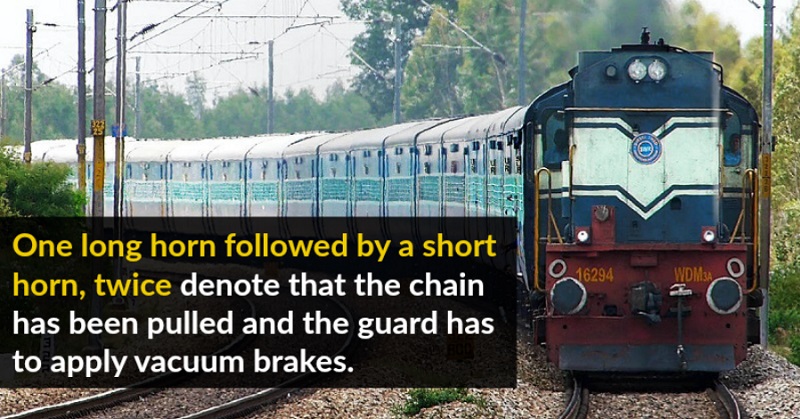Almost all of us have travelled through trains in this country. While people are familiar with information regarding the routes and railway stations, there is an aspect of the Indian Railways that not many people are familiar with – the horns and their purpose. Each and every horn blown on a train carries some unique significance which could completely change with even the slightest change in the way the horn is blown.
Here is a list of the horns that are used in the railways along with their significance:
ADVERTISEMENT
1. One short Horn
When one short horn is blown, it means that the driver of the train, i.e. the motorman is going to take the train to the yard for washing and cleaning.
2. Two short horns
A motorman blows two short horns in order to call for the guard’s signal before starting the train.
3. One long horn
This signifies the departure of the train from the station on receipt of clear signal.
Advertisment
4. One long and one short horn
After blowing of these horns, the guard releases the brakes and ensures that the main line is clear in order to start the train.
5. Two long followed by two short horns
These horns are blown in order to call the guard to come to engine of the train.
ADVERTISEMENT
6. Two short horns followed by a long horn
This signifies a sudden loss of brake pressure or vacuum, which could be due to an alarm chain being pulled.
7. Three short horns
This means that the train is out of control and the guard is required to assist or apply brakes.
8. Four short horns
This signifies that the train is unable to proceed due to an accident, failure or other such reason.
9. One very long horn
This type of horn has many reasons such as the train is approaching a level crossing or a tunnel area or its running through the station without stopping or recalling the staff protecting the train in the rear.
ADVERTISEMENT
10. One long horn followed by a short horn, twice
This means that the chain has been pulled and the guard has to apply vacuum brakes.
11. Six short horns
A motorman will blow six short horns if there is a premonition of danger or the train is moving in the wrong direction on a double line.
To conclude, the types of horns blown through a train’s journey are of great significance. They are a signal of things that are going to happen or that have happened and have been used since the early days of railways. So the next time you travel by a train, pay attention to the horns being blown to get a better understanding of things happening around you.
Also read- Ever Wondered Why Railway Station Board Has “Mean Sea Level” Mentioned On Them
